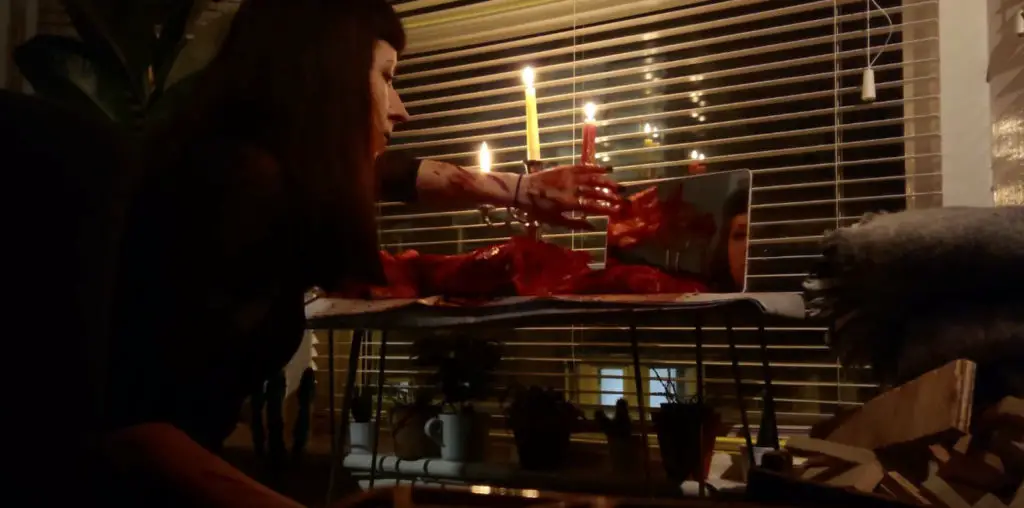
Hymns is one of the most devastating war movies in recent memory, as remarkable for what it doesn’t do as for what it does.
The film defies the conventions of its genre at every turn – the cast is small, the setting placid, the details left entirely ambiguous, the violence barely hinted at rather than depicted. The only tangible things that director Ryan Andrew Balas and writer Mark Robert Ryan seem interested in realizing onscreen are the chaos and heartbreak of wartime; everything else is stripped away as Hymns continues to twist that particular knife over an emotionally draining 77-minute running time. It’s a small movie, determinedly so, but its impact is a lot bigger than its scale.

“Hymns moves slowly but surely as it chronicles the gradual breakdown of the three women’s thrown-together homefront family…”
Taking place during an unnamed and long-standing conflict, the time period and geography of which are left deliberately vague (if the setting isn’t post-apocalyptic, it may as well be), Hymns follows a young woman named Ingrid (Deirdre Herlihy) whose husband Ellis (Ben Scott-Brandt) has been away fighting for some long but unspecified period of time. Holed up by herself in a cabin in the woods, she desperately awaits his return while contending with the periodic threat of chemical attacks and her own mounting loneliness. For reasons only glancingly suggested in the film’s fragmented prologue sequence, there’s no modern technology to keep her informed or protected; she writes letters to her husband, and the replies she receives are heavily redacted by the unspecified military regime that has conscripted him.
The film’s early sequences do a small bit of world-building, but what they’re mostly concerned with is solidifying its central relationship. While the questions raised about the war and the world are left mostly unanswered, what immediately and clearly resonates is Ingrid’s longing and despair. The best Ellis can do for her is to send his younger sister Irene (Melissa Navia) to stay with her, but the younger woman – somewhat more lively, but only slightly less haunted – isn’t nearly the comfort she needs. Also eventually thrown into the mix is Mary (Mirjam Egeris Karstoft), a naïve and almost childlike neighbor whose own husband (screenwriter Ryan, seen in flashback) has been killed in the war.
Hymns moves slowly but surely as it chronicles the gradual breakdown of the three women’s thrown-together homefront family, punctuated by sequences that achieve a Terrence Malick-like effect in juxtaposing voiceover of Ingrid and Ellis’s letters to one another with idyllic flashbacks and impressionistic shots of the forest landscape. There’s a tension throughout between philosophical musings about the impact and meaninglessness of war and the more tangible matter of Ingrid and Irene’s day-to-day survival in a place that’s almost entirely cut off from the world. It’s somewhat unclear whether they’re in any real danger from outside forces, but there’s a palpable immediacy to the tension between them; both, at times, seem ready to snap, despite their best efforts to stay civil and support one another.

“…a thoroughly unconventional war film, but the truths that it gets at are, sadly, all too familiar.”
It’s rare in this genre, even in films set on the homefront, to have such dynamic and complex female relationships as the focal point of the drama, and the film is a striking showcase for its lead actresses. As Ingrid, Herlihy has to do a lot of the heavy lifting performance-wise, and she’s able to keep the character sympathetic even as she becomes more and more unhinged and erratic. Navia is impressive also, providing a more youthful counterpoint to Ingrid and delivering a monologue late in the film that ranks among its most gut-wrenching moments. Hymns isn’t exactly a chamber piece – the setting is isolated, but not confining – but it nevertheless relies on moments like these for much of its dramatic effect, and despite its cast’s relative inexperience, they prove entirely capable of wringing intense emotion out of both the confrontations and the uncomfortable silences.
Of course, there’s a good chance that some audiences might be put off by the way Hymns defiantly avoids revealing almost anything about the external forces that put its characters into their situation, and literal-minded viewers are bound to be frustrated by mysteries that the film makes no effort to solve. For the filmmakers, though, that’s a feature, not a bug – the intent is clearly to render the experience of war as a universal rather than specific thing, and by not suggesting any particular real-world conflict, Hymns is able to signify all of them at once. It’s a thoroughly unconventional war film, but the truths that it gets at are, sadly, all too familiar.

Hymns (2016). Directed by Ryan Andrew Balas. Starring Dierdre Herlihy, Melissa Navia, Ben Scott-Brandt, Mirjam Egeris Karstoft
4 stars out of 5
Get more information on the official website for Hymns.

